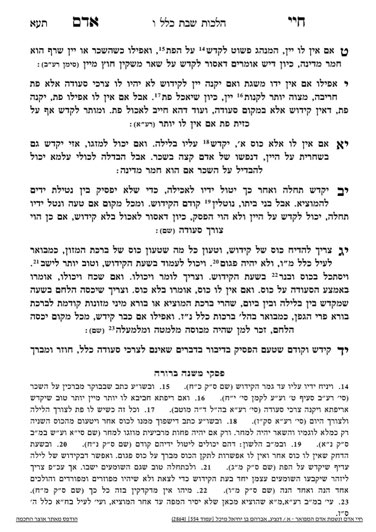The current series, which will cover Maariv on Friday night and Kiddush, is available for sponsorship. Please contact Rabbi Reingold for more information.
We are beginning siman 14, where the Chayei Adam will discuss a person who made kiddush and spoke before drinking. The Chayei Adam writes that if a person made kiddush and spoke words which were not related to the seudah, they are not yotzei borei pri hagafen. However, they are yotzei the bracha of mekadeish hashabbos, because it is not tied to drinking the wine. Therefore, they would only repeat the bracha of borei pri hagafen.
However, if a person speaks words related to kiddush, or even just related to the seudah, they do not need to repeat the bracha. The Gemara talks about a person speaking after making hamotzi, and the Gemara says that if it is related to the seudah, it is not a hefesk. However, we have learned that doing so is not lechatchilla, and only bedieved do we hold that it is not a hefsek. The Gemara says that even if the words spoken are not about the hamotzi (such as passing the salt), but about the meal (such as giving a portion to a guest), it is not a hefsek.
One could argue that there is a difference between the Gemara’s cases of hamotzi and the Chayei Adam’s application to kiddush. The hamotzi is part of the meal, so it is understandable why anything related to the seudah is not considered a hefsek. Arguably, kiddush is not part of the meal, but is a separate mitzvah performed before the meal. If so, one could argue that only words spoken which are relevant to kiddush will not be considered a hefsek, but words which are relevant to the meal would be considered a hefsek. Thus, the Chayei Adam is coming to teach us that this thought process is incorrect. Since kiddush is tied to the meal–because kiddush must be b’makom seudah–it sets the meal in motion. Therefore, anything related to the seudah is not considered a hefsek.
Another place where we see that kiddush is the beginning of the meal is that we have learned a person should not begin a meal within the 30 minutes before the zman of kriyas shema. If a person began the meal earlier than 30 minutes, they may continue. The Gemara discusses what constitutes the beginning of a meal, and says that in Bavel, it included loosening one’s belt in anticipation for the meal, which was a common practice there. In a place where it is not common practice, it is brought down in halacha that saying hamotzi is the beginning of the meal. On Shabbos, the meal begins with kiddush, and that would constitute having begun the meal. Thus, we see another place where the beginning of the seudah is defined by making kiddush.
Summary
Lechatchilla, one should not make any hefsek between kiddush and drinking the wine.
However, if one makes a hefsek related to the seudah, they are yotzei.
If one makes a hefsek not related to the seudah, they must repeat the bracha of borei pri hagafen. However, they were yotzei the bracha of mekadeish hashabbos.



